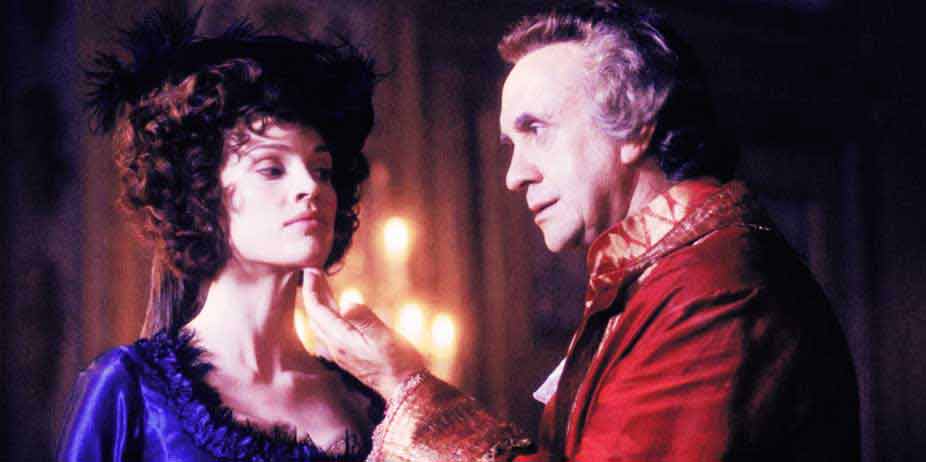
Affair of the Necklace (2001)
Napoleon credited the French Revolution to
three things. An unsympathetic monarchy, political
unrest abroad, and “the affair of the necklace.” This
film makes its heroine a lot more likable than her
historical counterpart (the real Jeanne La Motte was
not a nice person). It’s one of the most captivating
films I’ve ever seen.
The story centers on Jeanne La
Motte (Hillary Swank), left penniless by the political
unrest in France. The government accused her father of
siding with the Republic and seized his property. Ten
years later, Jeanne seeks to have them restored by
enlisting the aid of Marie Antoinette (Jolie
Richardson). She hopes her petition proving herself a
member of royalty will engage the queen’s sympathy, but
the queen ignores her attempts to gain an audience.
Her beauty, flash, and spirit catch
the eye of Rétaux de Villette (Sim Baker), the court’s
resident playboy and a favorite of the distinguished
women in Antoinette’s inner circle. Drawn by her naïve
desire to see wrongs righted, he agrees to help her gain
access to the throne by manipulating Cardinal Rohan
(Jonathan Pryce), the church’s lecherous authority in
France. Animosity has long existed between Antoinette
and the cardinal for a remark he made about bedding half
the Austrian court, including her mother. Knowing she
can use his weakness to their advantage, Jeanne and
Rétaux create a complex scheme to bring about the return
of her property using an elaborate, expensive diamond
necklace. The king commissioned the royal jewelers to
make it for his mistress, but she is now banished from
court.
Hoping Antoinette will want it,
Jeanne takes it to her with a plea for mercy, claiming
it has placed them in debt. Sneering at them, Antoinette
refuses its purchase. When the jewelers learn of
Jeanne’s falsified friendship with the queen, they
enlist her help to persuade the monarch to buy the
jewels. The consequences will send France spiraling into
turmoil, and it will hold one woman responsible for the
downfall of an empire.
The film is intriguing and
compelling, with a heroine not above stealing, lying,
and blackmail. But the movie doesn’t know whose side to
take; we feel empathy for the main characters, but also
sorry for the monarchy. We even hope the lecherous and
immoral cardinal comes out unscathed. From a visual
standpoint, it’s a masterpiece. The costuming, set
design, and cinematography are breathtaking, with
gorgeous camera angles. Antoinette’s entrance amid a
showering of flower petals, her visitation to Jeanne in
prison in the falling snow, and a midnight meeting in
the garden are just a few highlights. The rich colors
and textures transport us to a politically unstable
France on the brink of revolution.
The movie also illustrates the
greatest determent to the French’s failed attempt for
liberty—its godlessness. Not only does the cardinal
indulge in sinful pleasures, he also consults a resident
alchemist and seer, Count Cagliostro (Christopher Walkin),
whom Jeanne pays him to help her manipulate the
cardinal. The Affair of the Necklace is an
interesting historical piece with a dark but memorable
conclusion.
Sexual Content:
Jeanne's marriage is of convenience and both partners seek fulfillment elsewhere. Twice we briefly see female upper nudity -- on a prostitute fawning over Cagliostro in a brothel, and when the cardinal rips open a woman's dress. (Other bodices are also ripped open, with clear intimations.) Jeanne and Rtaux get as far as undressing one another and rolling around on the floor before her husband announces his presence. Innuendo hints at homosexual relationships among the court and Rtaux is (justly) accused of being a plaything for older women.
Language:
Three uses of GD, an abuse of deity, and one minor profanity.
Violence:
A woman is whipped and branded with an iron, and a beheading is implied.
